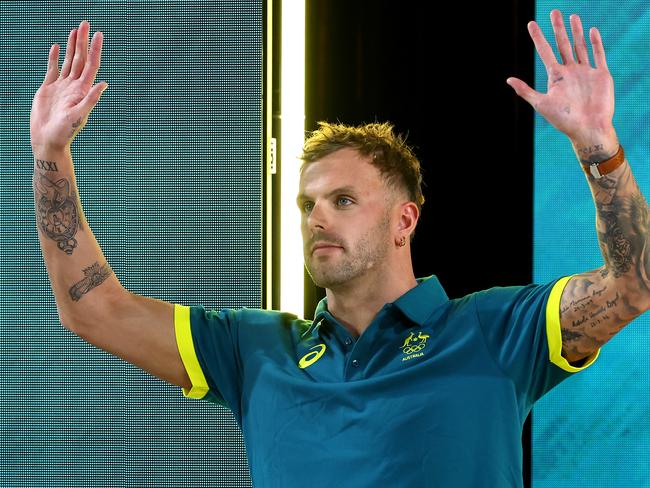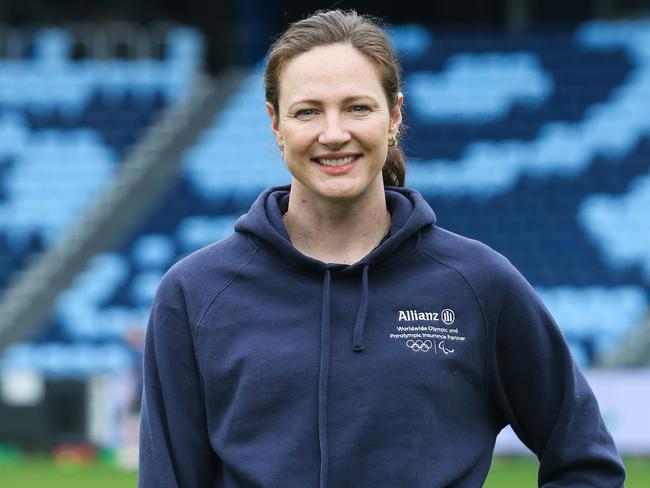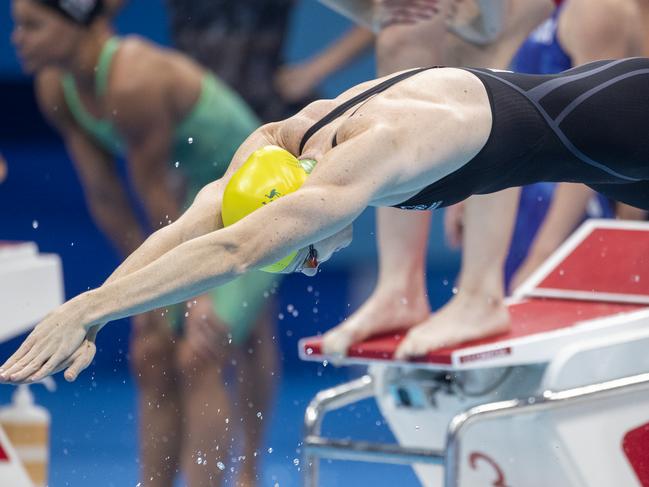Analysis: Relays promise Olympic gold for Australia’s women in the pool at Paris, but men face podium shut out
Every swimming relay for the Paris Olympic Games has been analysed and it appears Australia will again be relying on it’s women in the pool to return the gold. The full analysis here.
Swimming
Don't miss out on the headlines from Swimming. Followed categories will be added to My News.
Australian men are facing a potential Paris podium shut out in relays with 2024 world rankings firing an ominous warning that the Dolphins must execute to perfection to claim Olympic Games medals.
While Australia’s women are projected to win two relay gold medals in Paris – courtesy of their dominant 100m and 200m freestyle champions – it is the men who have a mountain to climb with none of the three relay teams rated among the fastest three based on 2024 best times.
The men’s 4x100m freestyle relay team are the reigning world champions, but sluggish performances at the Olympic trials means only Kyle Chalmers will enter the Olympic Games with a sub 48 second swim this year.

Compare that to the US men who boast all four swimmers under 48 seconds, and it’s clear Australia will need some stunning performances to challenge for any medal in Paris, let alone the gold.
But four-times Olympic relay gold medallist Cate Campbell is confident that Australia’s technical brilliance and team spirit can be the Dolphins’ trump card in Paris.
“Australia has such a long, rich history when it comes to relays,” Campbell said.
“We have seen people perform almost superhuman feats.
“You spend so much time by yourself in your own head, thinking of your own performance, that there is something so unique about being behind the starting block with three other athletes beside you and knowing that you are a part of a team. And it lifts you.”

But it takes more than just team spirit.
Along with swimmers taking enormous pride in being in relay squads, it’s a deeper focus on technical skills such as changeovers, dives and turns that is pushing Australian teams on to the dais.
Australia’s 4x200m freestyle women – led by Ariarne Titmus and Mollie O’Callaghan – hold a remarkable seven seconds advantage over their nearest rival on paper but that means nothing under the glare of an Olympic spotlight where executing under pressure is paramount.
“What we are doing so well in Australia is looking at the technicality of putting together the best relay teams that we can,” Campbell said.
“We do a lot of relay change over work, we make sure that everyone is able to swim in different combinations with people, so you’re not just used to changing over this from the same person time and time again.
“It doesn’t matter who you’re diving in over the top of, you can read their stroke know that you can execute really good skills and execute them under pressure.”
In fact, Campbell is the perfect example.
In what would turn out to be her final Olympic swim, she executed a changeover with such a small margin for error she was initially worried she may have broken when anchoring the medley relay in Tokyo in an effort that ultimately delivered a gold medal.
“My example from Tokyo is a classic example. If I hadn’t executed that changeover to absolute perfection – there was four one-hundredths of a second (from the time that butterflier Emma McKeon hit the wall to when Campbell left the blocks) – we don’t win that gold medal,” she said.
“If my changeover had been the same as my US counterpart – which was 0.3, also a ridiculously small length of time – we don’t win that gold medal.
“I think that that’s what Australia has been able to do better than any other country in the world, is really hone our relay skills, because we have really targeted the relays for a long time.”

Campbell said that for a long time, those swimmers who made the team only as relay swimmers and without an individual event, were seen as a “second tier” part of the team.
But that had changed over the past decade, with relays an indication of the depth of a country’s talent and underlining their overall strength.
“We’ve really changed that narrative,” Campbell said.
“I think that anything can happen on the day and this focus on camaraderie and the team aspect of an individual sport, combined with excellent technical skills, means that our relays are always in the mix and you can never count us out.”
Here is News Corp Australia’s detailed analysis of every swimming relay race for the Paris Olympic Games:
Australia won the world title in Fukuoka last year, but in the fair dinkum department, they are in a battle to even reach the podium in Paris. That’s not to say they can’t, but the reality is it will take four of the best swims of their lives to win a medal and something even more spectacular to stop the United States from taking glory. The US is the only team in the field who boast four 47-second swimmers in their relay team. Even reigning Olympic champ Caeleb Dressel couldn’t place in the top two at trials to secure the chance to defend his individual title in Paris such is the incredible speed coming out of the States. If you rank teams based on times swum this season, Australia comes in at fifth behind China, Great Britain and France. But, Australian swimmers were pretty poor at the selection trials and we know some of those guys can go much quicker. Can they catch the US quartet? It is doubtful.
Let’s put the mock on them right now and declare it – Great Britain cannot possibly lose this gold medal. The defending champions have four men ranked inside the top 10 this year and after winning the Tokyo gold medal by over three seconds the form guide suggests a similar victory is on the cards again in Paris. Australia will be in the battle for the minor medals, but again, times this season suggest the Dolphins will not feature on the podium with USA and Korea coming in with faster cumulative times.
Only once since 1960 has USA failed to win the gold medal in this event but prepare for a potentially historic moment in Paris as the almighty USA are under threat big time in this event. China has emerged as the latest threat to the superpower with their current times suggesting 100m freestyle world record holder Pan Zhanle could enter the anchor leg on level pegging, or even ahead, of the Americans. But the US are the kings of relays and particularly relay changeovers, so you’d have to consider they will enter as favourites regardless of what the 2024 form guide suggests on paper. Australia is rated as the fourth fastest team based on 2024 times, with Great Britain edging ahead although the fight for bronze could be intense with Italy and hosts France all projected to be within half a second of each other in a four-way fight for third.
The Aussies have won this race at the last three Olympics. There will be no Cate Campbell this time but her sister Bronte and Emma McKeon will be there, flying the flag for the over 30s as they look for their third successive wins. Mollie O’Callaghan and Meg Harris were part of the team in Tokyo so are looking for more gold, while Shayna Jack and rookie Olivia Wunsch are the newcomers. Canada won silver at Tokyo but the US and China are the biggest obstacles to the Dolphins this time.
This was the one that got away in Tokyo. Australia should have won the gold but stuffed up the selections and ended up with bronze. They won’t make the same mistake this time with Titmus and O’Callaghan guaranteed two spots and Lani Pallister a virtual lock, leaving Shayna Jack, Brianna Throssell, Jamie Perkins and possibly Kaylee McKeown to swim the heats and fight for the other spot in the final. China won gold in Tokyo with two of their swimmers getting let off after failing drug tests. Led by Ledecky, the Americans will need to pull off a miracle to catch the Aussies because they are over eight seconds behind on their results from the trials.
Australia won the gold in Tokyo after an incredible anchor leg swim from Cate Campbell and a best-ever swim from now retired breaststroker Chelsea Hodges. It’s hard to see the Dolphins repeating that in Paris because their rivals have an even bigger advantage on the breaststroke leg this time but they should still make it to the podium for the eighth time in a row – a streak that started back at Atlanta in 1996.
Another tricky race where the selectors can sometimes play as big a part as the swimmers in deciding the medals. Britain won the first ever gold in Tokyo, ahead of China and Australia, off the back of Adam Peaty’s unmatched breaststroke performance but expect the US to perform better this time. Sam Williamson’s improvement in breaststroke gives the Dolphins fresh hope for another relay medal.




